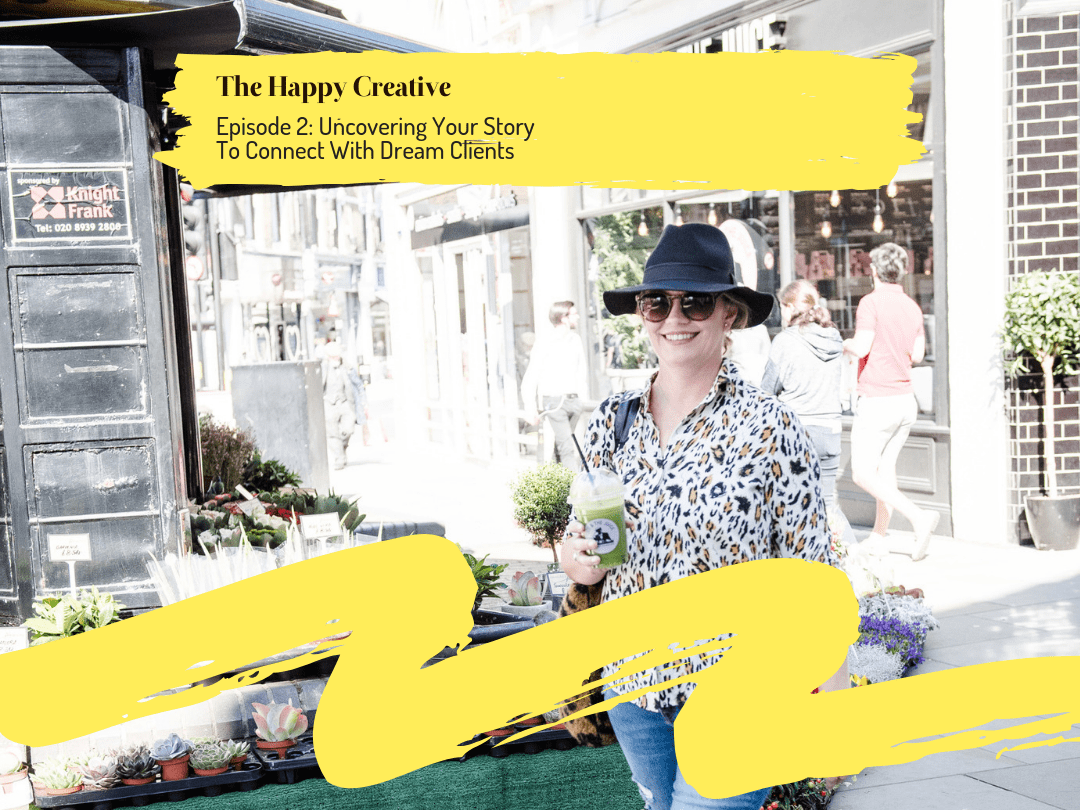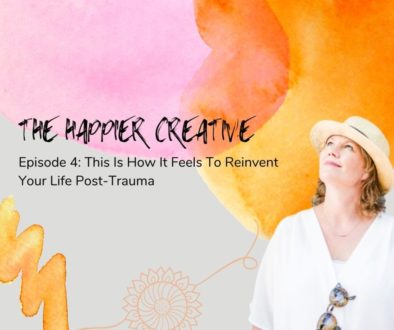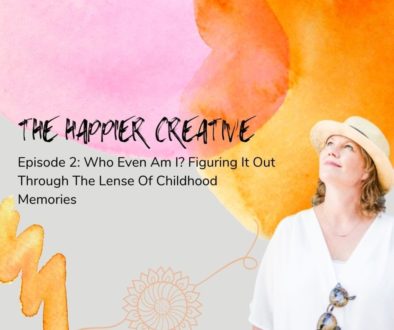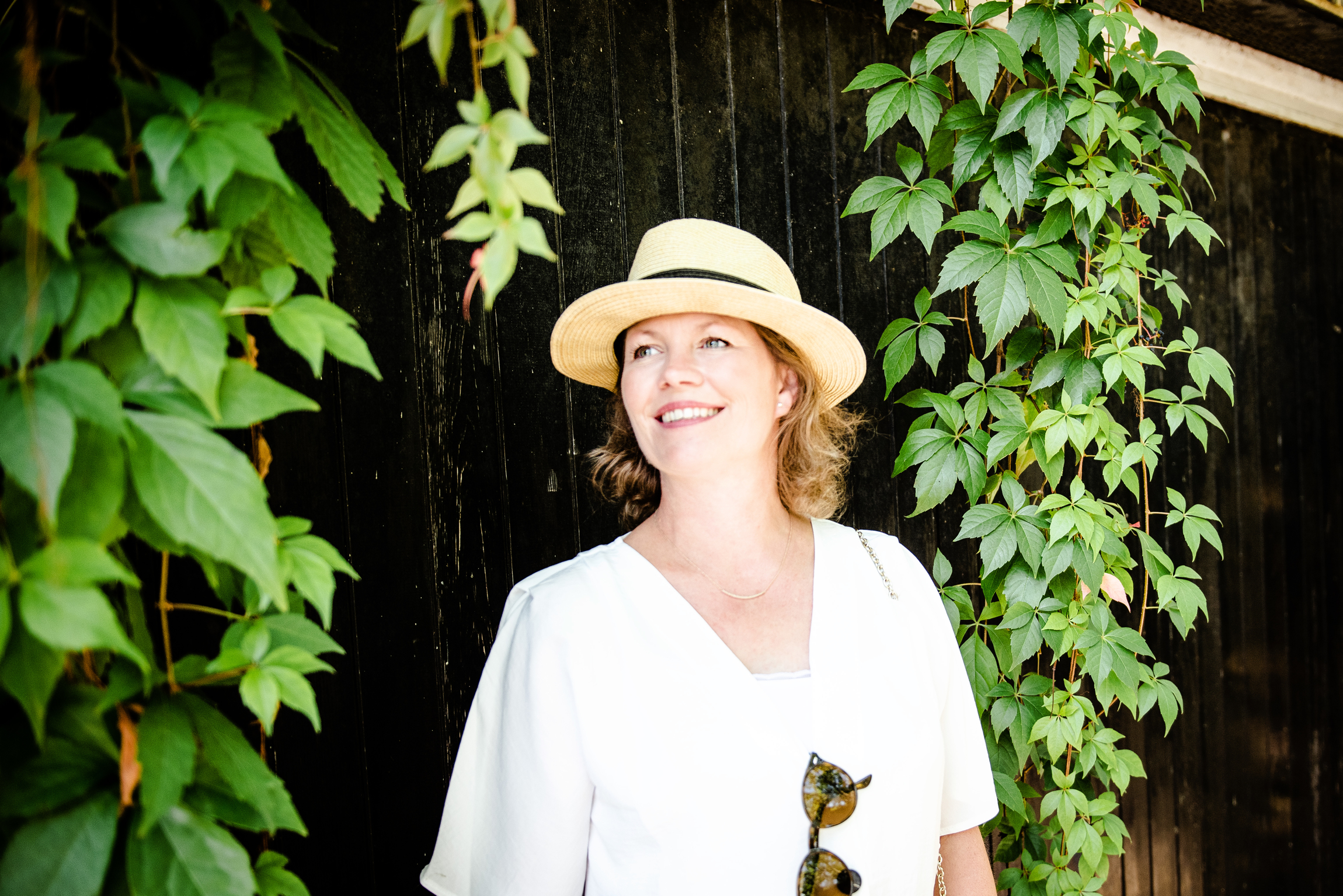The Happy Creative: Episode 2. Uncover Your Story To Connect With Dream Clients
In the second Episode of The Happy Creative podcast I’m sharing all things storytelling. I know what a powerful and high-impact being clear on your business story has on creative businesses working on a limited marketing budget. You can use storytelling to super-charge your marketing and connect with your dream clients and customers.
[powerpress]
HERE’S WHAT I TALK ABOUT IN THIS EPISODE:
- Why stories are so powerful for small businesses on a limited marketing budget.
- Why anyone can learn to be a storyteller and I bust some myths about storytelling for business.
- The 5 questions you need to ask yourself about your business story.
- What to include in your story and why it needs to have purpose.
- Making your dream clients the hero of your story.
- The importance of using emotion in your story.
- Narrative and the classic three act technique you can start to use right away.
- Developing a theme and being consistent.
LINKS & RESOURCES:
Download my workbook Uncover Your Brand Story
5 Questions I Asked Myself About My Own Business Story
READ IT HERE TOO:
Hello. Thank you SO much for tuning in to The Happy Creative podcast. This is a feel-good show focused on helping you build a joyful and happy creative business that you’re totally in love with. It’s also a place to inspire you if you’re yearning to grow your own creative business but just don’t know where to start.
My mission on this planet is to help creatives just like you create rewarding, content-rich and profitable online businesses. My mantra for this year is “I’m prepared for the very best-case scenario” and I want to help you be prepared for all the awesome things that are going to happen in your creative journey this year.
So today, my friend, we’re talking storytelling. This is a subject SO close to my heart because I truly believe that you and your creative business have a valuable story to share with the world. Furthermore, your story will reach out to your dream clients and connect with their hopes and fears and make them want to buy from you.
I studied film at uni and I’ve been making a living from online content ever since. In 2010 I set up and grew my own content agency that attracted major brands via the content and stories we shared online.
So why is uncovering and telling our story so important?
Well, I think this quote by film director Jean-Luc Godard is so relevant to creative businesses like ours and a great place to start.
“Sometimes reality is too complex. Stories give it form.”
I love this and it feels so true when I look at my own business because if you think about it, we are wired from babyhood to learn about our world through stories. It’s a fact that sales and marketing can seem complex (all the diagrams and buzzwords) but the story we wrap around what we do is way more interesting than the stats or facts or service descriptions.
So whether you’re a yoga teacher, a writer, a photographer or a maker, starting your business by uncovering your story is the very first step in creating a compelling content strategy. Our stories are the beating heart of our creative businesses. It’s what is going to build the know, like, trust factor that turn your people into your clients.
Finally, as small businesses we are on shoestring budgets, we don’t have the money to buy brand awareness, so we have to really capture the hearts and minds of our people through our story. This is storytelling with a purpose!
OK, so before I dive into how you can uncover your business story, I want to bust a couple of myths that I hear all the time.
Myth #1: I’m not a natural storyteller.
My friend, nobody is born a natural storyteller but anyone can learn to be one. Beyonce, one of my favourite storytellers and creative directors on earth ever was not born a storyteller. Shakespeare was not telling stories at 5. Those Instagrammers who have the juiciest feeds that you come back to time and time again? They developed their story over time and you can do exactly the same.
One of my favourite ever actors Bill Murray says this:
“I don’t think you are born with it. You have to hear stories and you have to live stories. You have to have a bunch of experiences and be able to say “here’s something that happened to me.”
What I love about this quote is that he’s saying you have to live your life to tell your story. And this is just as relevant to our creative businesses as it is to our personal lives.
Myth #2: Not everyone has a story to tell
Again, I absolutely promise you that you have a story to tell. I hear people say this all the time, that they have had limited experience or that they don’t think they can compare with people who have made a difference, or had big life experiences but honestly, my friend this is just a classic case of comparison syndrome. Everyone – and I mean everyone – has a relevant story. Your brand has a history, it didn’t just happen!
So now I’m going to help you develop the story of your business with this simple approach. This is the first step in developing an awesome content strategy that people are totally going to connect with (which we’re going to cover in more detail in the next episode).
# 1 Ask yourself these 5 questions
What is the background story your business (people LOVE authenticity)
What happened to spark the start or pivoting of your business? (people love to know what motivates people)
How do you do fix the problems of your people? (yes your story is the difference you make to your people)
What is your mission on this planet?
What 3 things make your business amaaaazing? (don’t be shy!)
So, I’m going to share my own answers with you and a few other examples over in the show notes on ruthhoskins.com/thehappycreativepodcast along with a link to a workbook called Uncovering The Story Of Your Creative Business that you can download to work on at home
#2 Get super clear on your purpose
How do you want your story to make people feel? Maybe you’re a writer and you want to connect with creative businesses and you want them to feel inspired to work together through your words. Maybe you are a stylist and you want to make women feel empowered. You have to be clear on your purpose and then reverse engineer your story back from these points.
Boundaries – what are you willing to share an unwilling to share. This is a biggie for me because using emotion will help you connect but that doesn’t mean you have to share anything and everything. Pick the elements that are most relevant or interesting to your business and cut everything else out.
# 3 Make your dream clients your hero
Everybody loves a hero, so make your dream client your hero. Think about the story from their perspective, how can you help them rise to the challenge, overcome the hard stuff and give them the happy ending that we all love?
Make your story all about them – the businesses I see who have the biggest impact and resonate with me most are those that speak directly to their people and solve their problems.
So to give an example of this, a highlight of this has been working with my coach Jen Carrington to help me shape out my business. I connected with her via her podcast, where almost everything she said connected with me in a powerful and intimate way and I knew I had to work with her.
Loyal customers will bring your brand’s story to life – share their stories, testimonials….
# 4 Get comfortable with emotion
Be open about your struggles, the things that went wrong as well as right
Use emotion to connect, it makes you human and relatable
Vulnerability and authenticity are really valued
Be empathetic – does your content resonate with your dream clients’ values or does it answer a problem they’re experiencing? The more empathy you show to your people, the more impact your story will have.
So my message to you here is don’t focus on “selling your business”, sell your story instead. Make people feel something. The rest will come naturally.
# 5 Narrative
Surprise and delight – people love a bit of suspense.
I always think there’s a very fine line between sharing and over-sharing. I hear a lot of people say that they feel they have to share everything, especially on Stories. The question I would ask myself is “is this relevant to my story”? I honestly don’t think we have to share everything for people to buy from us. Keep some surprise elements in there. This is YOUR business, curate your story in a way that feels good for you.
Rule of 3 – we all know things come in threes. Classic three-act narrative that applies to lots of small businesses (problem – solution – success). Work this into your content, your social media and your voice. What problem are you solving and how. What are the results going to be? Then link this back to the hero – your dream client.
# 6 Consistency
One thing I remember from my storytelling days is the old journalist favourite – tell them what you’re going to tell them, tell them, tell them what you’ve told them and keep telling them.
Being consistent in your brand story is as important as with your brand assets like imagery.
Develop themes and streams of your story. I’ll cover this in more detail when I go into creating content in the next episode.
# 7 Go write your story!
So now I’m going to set you a challenge. Schedule in a meeting with yourself to vision out your story. You can do this in all kinds of ways – using Pinterest, cutting out pictures and sticking them on paper, or just writing it out. Whatever works best for you but I want you to ask yourself those questions, think about the impact you are having and develop your song, your narrative, your story so you can release it into the world.
I’m sharing my own story, using this approach over on the show notes that you can see as an example, as well as download a short workbook that you can use to write-up the story of your business.




